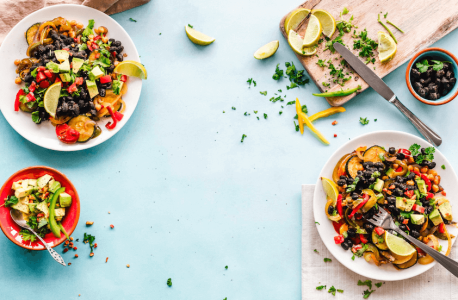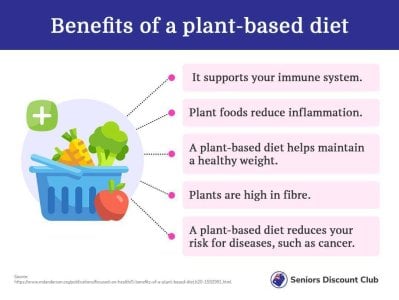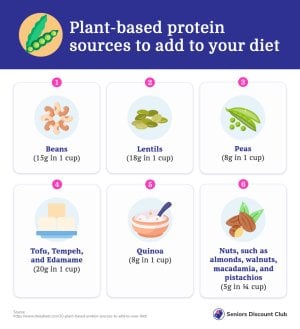Is going plant-based the key to a healthier and more affordable grocery list?
- Replies 19
Are you tired of feeling the pinch of the rising cost of living? Many Aussies are facing a tough decision regarding their weekly grocery shop. Do you eliminate your favourite premium items or settle for a generic brand? It's a hard choice to make when you're trying to make ends meet.
But what if there was a better way to save money on your groceries without sacrificing the quality of your diet?
A recent research study conducted by Perspectus Global and the No Meat May campaign found that more and more Australians are switching to vegetarian and plant-based options at the supermarket.
It may surprise you that 37 per cent of Aussies surveyed are buying fewer meat items to save money, as plant-based foods tend to be much cheaper than their animal-based counterparts. Also, 61 per cent of those surveyed are considering increasing their plant-based consumption to reduce their weekly grocery costs further.

Ryan Alexander and Guy James Whitworth, the founders of the No Meat May campaign, believe that more people would be open to adopting a vegan diet if they knew how much money they could save.
According to their research, 81 per cent of consumers would consider shifting to a plant-based diet if they could save a third of their grocery bill, but only 37 per cent are currently doing so. The No Meat May campaign encourages people to stick to a plant-based diet for a month, and since its launch in 2013, over 160,000 people have participated.
As a result, it's estimated that over 9.9 million animals have been saved from slaughter, and participants have also saved a considerable amount of money in the process.
Are you curious whether plant-based products are healthier than their meat-based counterparts? The earthy-toned labels of these products often give off a vibe of goodness and nutrition, but is this just a marketing tactic?
According to a CHOICE survey, almost half (46 per cent) of Australians believe that packaged foods labelled 'plant-based' are healthy. But what does the science say?
A nutritional analysis conducted by Food Frontier compared conventionally processed meats with 95 plant-based meat alternatives.
The results showed that when compared like-for-like with traditional meat sausages, burgers, bacon, and poultry, plant-based meat alternative products are, on average, nutritionally comparable or superior.
So, for those seeking to reduce their meat consumption while still enjoying a burger on the barbeque, plant-based meats can serve as a healthier alternative. They tend to contain more dietary fibre and lower saturated fat than their meat counterparts.
However, it's worth noting that we're talking about sausages, burgers, bacon, and schnitzels – meats that global health authorities suggest everyone avoid, even if they don't follow a plant-based diet.
It's important to remember that sausage is still a 'sometimes' food, whether it's plant-based or meat-based. And, just because something is labelled as 'vegan' doesn't necessarily mean it's healthy.
Sugary confectionery is never good for you, no matter what label it has. So, when it comes to making healthy choices, it's always best to focus on whole foods and a balanced diet.
Are plant-based products really cheaper than their meat-based counterparts? The folks at No Meat May claim they can be a money-saver, but is it true? Well, according to CHOICE, it's not always that straightforward.
While plant-based options may seem like a sensible choice, they can sometimes be pricier than their meat-based equivalents. One reason is that they often require unique ingredients to create a desirable texture or flavour, which can drive up the cost. Other factors like processing methods, facilities, and distribution costs can also make them more expensive.
But let's not forget about opportunistic marketing, either. It's not uncommon to see 'plant-based' or 'vegan' versions of identical foods with premium price tags. So, while plant-based options may be more affordable in some cases, it's important to shop around and compare prices.
The cost of plant-based products is just one factor to consider. Whether you're a meat-eater or a plant-based devotee, choosing nutrient-dense whole foods is always a good idea for your health and your wallet.

There are many factors to consider when it comes to choosing between meat-based and plant-based products. While plant-based alternatives may offer certain health benefits and cost savings, it's important to weigh these factors against other considerations, such as taste and convenience.
Ultimately, the decision about whether to opt for plant-based products or stick with meat-based options is a personal one. It may be worth experimenting with a mix of both to see what works best for your taste buds, your budget, and your overall lifestyle.
Members, what do you think about the rise of plant-based products in Australia? Have you tried any plant-based products recently, and if so, what did you think?
Also, are you considering making the switch to a plant-based diet, even just for a few days a week? Have you already made the transition, and if so, how has it impacted your health and wallet? Let us know in the comments!
But what if there was a better way to save money on your groceries without sacrificing the quality of your diet?
A recent research study conducted by Perspectus Global and the No Meat May campaign found that more and more Australians are switching to vegetarian and plant-based options at the supermarket.
It may surprise you that 37 per cent of Aussies surveyed are buying fewer meat items to save money, as plant-based foods tend to be much cheaper than their animal-based counterparts. Also, 61 per cent of those surveyed are considering increasing their plant-based consumption to reduce their weekly grocery costs further.

Soaring food costs are forcing some Australians to make substantial dietary changes by turning to vegetarian and plant-based options. Credit: Pexels/Ella Olsson.
Ryan Alexander and Guy James Whitworth, the founders of the No Meat May campaign, believe that more people would be open to adopting a vegan diet if they knew how much money they could save.
According to their research, 81 per cent of consumers would consider shifting to a plant-based diet if they could save a third of their grocery bill, but only 37 per cent are currently doing so. The No Meat May campaign encourages people to stick to a plant-based diet for a month, and since its launch in 2013, over 160,000 people have participated.
As a result, it's estimated that over 9.9 million animals have been saved from slaughter, and participants have also saved a considerable amount of money in the process.
Are you curious whether plant-based products are healthier than their meat-based counterparts? The earthy-toned labels of these products often give off a vibe of goodness and nutrition, but is this just a marketing tactic?
According to a CHOICE survey, almost half (46 per cent) of Australians believe that packaged foods labelled 'plant-based' are healthy. But what does the science say?
A nutritional analysis conducted by Food Frontier compared conventionally processed meats with 95 plant-based meat alternatives.
The results showed that when compared like-for-like with traditional meat sausages, burgers, bacon, and poultry, plant-based meat alternative products are, on average, nutritionally comparable or superior.
So, for those seeking to reduce their meat consumption while still enjoying a burger on the barbeque, plant-based meats can serve as a healthier alternative. They tend to contain more dietary fibre and lower saturated fat than their meat counterparts.
However, it's worth noting that we're talking about sausages, burgers, bacon, and schnitzels – meats that global health authorities suggest everyone avoid, even if they don't follow a plant-based diet.
It's important to remember that sausage is still a 'sometimes' food, whether it's plant-based or meat-based. And, just because something is labelled as 'vegan' doesn't necessarily mean it's healthy.
Sugary confectionery is never good for you, no matter what label it has. So, when it comes to making healthy choices, it's always best to focus on whole foods and a balanced diet.
Are plant-based products really cheaper than their meat-based counterparts? The folks at No Meat May claim they can be a money-saver, but is it true? Well, according to CHOICE, it's not always that straightforward.
While plant-based options may seem like a sensible choice, they can sometimes be pricier than their meat-based equivalents. One reason is that they often require unique ingredients to create a desirable texture or flavour, which can drive up the cost. Other factors like processing methods, facilities, and distribution costs can also make them more expensive.
But let's not forget about opportunistic marketing, either. It's not uncommon to see 'plant-based' or 'vegan' versions of identical foods with premium price tags. So, while plant-based options may be more affordable in some cases, it's important to shop around and compare prices.
The cost of plant-based products is just one factor to consider. Whether you're a meat-eater or a plant-based devotee, choosing nutrient-dense whole foods is always a good idea for your health and your wallet.
Key Takeaways
- The rising cost of living in Australia is causing many to make drastic changes to their weekly shop, including buying fewer meat items.
- Research by Perspectus Global and the No Meat May campaign shows that about 37 per cent of Aussies surveyed are buying fewer meat items in order to save money, with 61 per cent considering increasing their plant-based consumption to reduce costs.
- However, according to CHOICE, some plant-based processed foods may be more expensive than their meat-based alternatives due to unique ingredients, processing methods, and extra supply-chain costs.
There are many factors to consider when it comes to choosing between meat-based and plant-based products. While plant-based alternatives may offer certain health benefits and cost savings, it's important to weigh these factors against other considerations, such as taste and convenience.
Ultimately, the decision about whether to opt for plant-based products or stick with meat-based options is a personal one. It may be worth experimenting with a mix of both to see what works best for your taste buds, your budget, and your overall lifestyle.
Members, what do you think about the rise of plant-based products in Australia? Have you tried any plant-based products recently, and if so, what did you think?
Also, are you considering making the switch to a plant-based diet, even just for a few days a week? Have you already made the transition, and if so, how has it impacted your health and wallet? Let us know in the comments!









